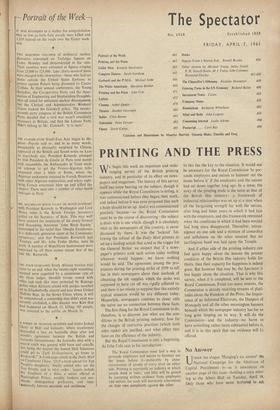PRINTING AND THE PRESS
WE begin this week an important and wide- ranging survey of the British printing industry, and in particular of its effect on news- papers and magazines. The history of this survey itself has some bearing on the subject; though it appears while the Royal Commission is sitting, it was commissioned before they began their work, and indeed before it was even proposed that such a body should be set up. And it was commissioned precisely because--as the Royal Commission must be in the course of discovering—the subject it deals with is one which, though it is absolutely vital to the newspapers of this country, is never discussed by them. It was the 'lockout' fol- lowing the refusal of the Daily Mail printers to set up a leading article that acted as the trigger for the General Strike; we suspect that if a news- paper's printers took such action today nothing whatever would happen: we know nothing would be said. The agreement among the pro- prietors during the printing strike of 1959 to tell lies in their newspapers about their methods of obtaining the ink supplies which the strike was supposed to have cut off was rigidly adhered to, and there is no reason to suppose that this entirely typical situation would be any different today. Meanwhile, newspapers continue to close; only the naive see no connection between these facts.
The first thing for the Royal Commission to do, therefore, is to discover just what are the con- ditions in the British printing industry; how far the charges of restrictive practices (which both sides make) are justified, and what effect they have on the efficiency of the industry.
But the Royal Commission is only a beginning. As John Cole says in his introduction :
The Royal Commission must find a way to persuade employers and unions to hammer out the issues before it--preferably by cross- examination of people at every level on either side. Printing is supremely an industry in which *people think in 'sides,' and little will be gained by accepting written evidence from employers and unions, for each will inevitably concentrate on their own complaints against the other. In this lies the key to the situation. It would not be necessary for the Royal Commission `to per- suade employers and unions to hammer out the issues before it' if the employers and the unions had sat down together long ago. In a sense, the story of the printing trade is the same as that of the British film industry: a framework of industrial relationships was set up at a time when all the bargaining strength lay with the unions, after long and bitter years in which it had lain with the employers, and this framework remained when the conditions in which it had been erected had long since disappeared. Thereafter, intran- sigence on one side and a mixture of cowardice and selfishness on the other ensured that no sacrilegious hand was laid upon the Temple.
And if either side of the printing industry can feel quite happy about the lessons the present condition of the British film industry holds for theirs, then their capacity for happiness is indeed great. But however that may be, the Spectator is less happy about the situation. That is why this survey, when it is completed, will be sent to the Royal Commission. From too many sources, the Commission is already receiving streams of plati- tudes about the Freedom of the Press, the Impor- tance of an Informed Electorate, the Dangers of Monopoly and all the other meaningless banners beneath which the newspaper industry has for so long gone limping on its way. It will do the Commission—and the industry—no harm to have something rather more substantial before it, and it is in this spirit that our evidence will b. offered.






































 Previous page
Previous page